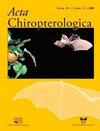斯皮克斯圆盘翼蝙蝠(三色甲状腺翅目)接触叫声的季节性表明其在吸引配偶方面的潜在作用
IF 0.7
4区 生物学
Q4 ZOOLOGY
引用次数: 1
摘要
多项研究表明,动物在行为上表现出一致的个体差异,但它们也会经历与季节事件相关的行为反应的短期变化,最明显的是繁殖。我们比较了Spix的盘翅蝙蝠(三色甲状腺目)在繁殖期和非繁殖期以及雄性和雌性的呼唤率。这个物种在社会协调的背景下进行询问和回应呼叫的交换,这些声音被个体用来表明栖息地的位置。我们的研究结果表明,在繁殖季节,所有雄性都发出声音,并且发出更多的回应叫声。在雌性中,我们发现它们在繁殖期和非繁殖期的发声行为没有显著差异。尽管发声会导致更大的能量消耗和被捕食的风险,但当雌性排卵期时,雄性会发出更多的声音。因此,我们的研究结果表明,响应呼叫不仅可以促进群体凝聚力,正如之前的研究发现的那样,而且还可以在求爱中发挥作用。本文章由计算机程序翻译,如有差异,请以英文原文为准。
Seasonality in the Emission of Contact Calls in Spix's Disc-Winged Bats (Thyroptera tricolor) Suggests a Potential Role in Mate Attraction
Multiple studies show that animals exhibit consistent individual differences in behavior, but they also experience short-term changes in their behavioral responses associated with seasonal events, most notably reproduction. We compare calling rates between the breeding and non-breeding seasons, and between males and females, in Spix's disk-winged bats (Thyroptera tricolor). This species performs an exchange of inquiry and response calls in a context of social coordination and these vocalizations are used by individuals to signal roost location. Our results indicate that during the breeding season all males vocalize and also emit a greater number of response calls. In females, we found that there is no significant difference in their vocal behavior during the breeding and non-breeding seasons. Even though being vocal leads to greater energy costs and risk of predation, males were more vocal and emitted more vocalizations when females are known to be ovulating. Therefore, our results suggest that response calls may not only facilitate group cohesion, as found in previous studies, but that it may also play a role in courtship.
求助全文
通过发布文献求助,成功后即可免费获取论文全文。
去求助
来源期刊

Acta Chiropterologica
生物-动物学
CiteScore
2.50
自引率
20.00%
发文量
42
审稿时长
>12 weeks
期刊介绍:
Acta Chiropterologica, published by the Museum and Institute of Zoology at the Polish Academy of Sciences, is devoted solely to the study and discussion of bats.
 求助内容:
求助内容: 应助结果提醒方式:
应助结果提醒方式:


